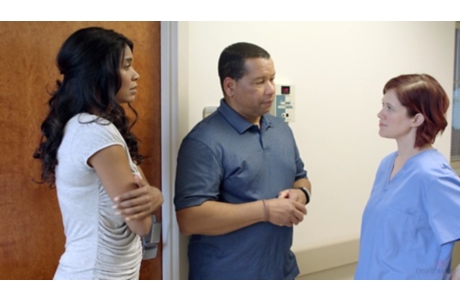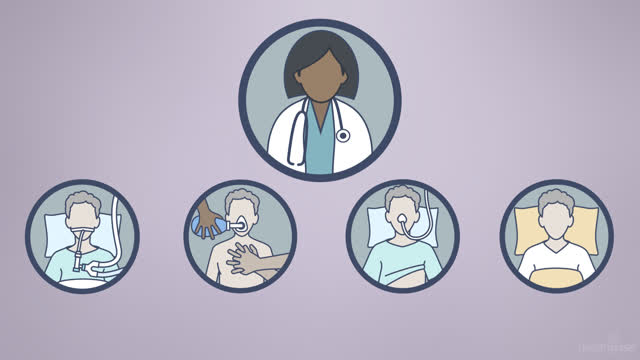Turning Off Your ICD
Topic Overview
How does your ICD help you?
Your ICD can save your life.
Your ICD (implantable cardioverter-defibrillator) is always checking your heart rate and rhythm. If the ICD detects a life-threatening rapid heart rhythm, it tries to slow the rhythm back to normal using electrical pulses. If the dangerous rhythm doesn’t stop, the ICD sends an electrical shock to the heart to restore a normal rhythm.
Some ICDs also can fix a heart rate that is too slow. The ICD does so without using a shock. It can send out electrical pulses to speed up a heart rate that is too slow.
Should you consider turning off your ICD?
Even though an ICD can help fix heart rate or rhythm problems, you may not want this at the end of life. Many people consider turning off their ICD when their health goal changes from living longer to getting the most comfort possible at the end of life. The shocks the ICD delivers are painful. Not being shocked will make you more comfortable at the end of life.
As you plan for your future and your end of life, include plans for your ICD. The decision to turn off your ICD is part of the medical treatment you want at the end of life. You can put this information in your advance directive.
Turning off your ICD is legal. It isn’t considered suicide. The decision to leave on or turn off your ICD is a medical decision you make based on your values.
What happens if the ICD is turned off?
Turning off an ICD isn’t hard. The ICD isn’t taken out of your chest, and you don’t need surgery. Your doctor will use a computer to reprogram the ICD so that it doesn’t give you shocks. This isn’t painful.
Turning off the ICD won’t cause death, and it won’t make you feel worse. But because the ICD won’t give you a shock if you have a life-threatening heart rhythm, this type of heart rhythm could lead to death.
Pacemakers
Some ICDs are combined with a pacemaker. You can turn off the ICD without turning off the pacemaker. Your doctor can explain how your pacemaker might affect you at the end of your life.
Who makes the decision?
You make the decision about whether or not you want to turn off your ICD. It can be a tough decision to make, but you don’t have to make it alone. Look to your family, your doctor, your spiritual adviser, and your friends for help and support.
Things to think about
- Your future and quality of life. What can you expect as your health problems get worse? What type of health care do you want at the end of life? Do you want to be shocked by your ICD without it helping you live much longer?
- Your health. Is a heart problem your only health problem?
- Timing. When do you want to turn off the ICD? Some people wait the until end of life is close, but others want it turned off well before this.
- Personal issues. Do you have any personal goals you would like to meet? Do you need to say any final goodbyes? You may want to keep your ICD on until you can achieve them.
- Your care and comfort. If you turn off your ICD, you will still receive your usual care. You’ll still be treated for other health problems and have doctor visits as necessary. If it is toward the end of life, you can still get care, called hospice care, that focuses on pain relief, comfort, and the quality of your life.
- An advanced directive. Do you want to put your instructions in an advanced directive? Do you want this decision to be made earlier or later? Do you want to be sure your wishes are followed?
- It’s your decision. You can change your mind at any time.
Health Tools
Health Tools help you make wise health decisions or take action to improve your health.
References
Other Works Consulted
- Al-Khatib SM, et al. (2017). 2017 AHA/ACC/HRS guideline for management of patients with ventricular tachycardias and the prevention of sudden cardiac death. Circulation, published online October 30, 2017. DOI: 10.1161/CIR.0000000000000549. Accessed November 6, 2017.
- Lampert R, et al. (2010). HRS Expert Consensus Statement on the Management of Cardiovascular Implantable Electronic Devices (CIEDs) in patients nearing end of life or requesting withdrawal of therapy. Heart Rhythm, 7(7): 1008–1026. Available online: http://www.hrsonline.org/Policy/ClinicalGuidelines/upload/ceids_mgmt_eol.pdf.
- Russo JE (2011). Deactivation of ICDs at the end of life: A systematic review of clinical practices and provider and patient attitudes. American Journal of Nursing, 111(10): 26–35. Also available online: http://journals.lww.com/ajnonline/Fulltext/2011/10000/Original_Research__Deactivation_of_ICDs_at_the_End.18.aspx.
Current as of: April 9, 2019
Author: Healthwise Staff
Medical Review:Kathleen Romito MD – Family Medicine & Martin J. Gabica MD – Family Medicine & Adam Husney MD – Family Medicine & John M. Miller MD, FACC – Cardiology, Electrophysiology
This information does not replace the advice of a doctor. Healthwise, Incorporated, disclaims any warranty or liability for your use of this information. Your use of this information means that you agree to the Terms of Use. Learn how we develop our content.






